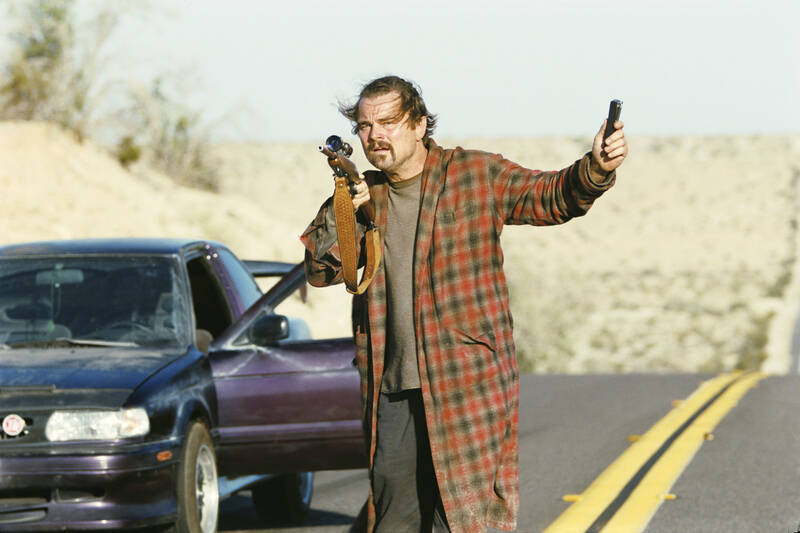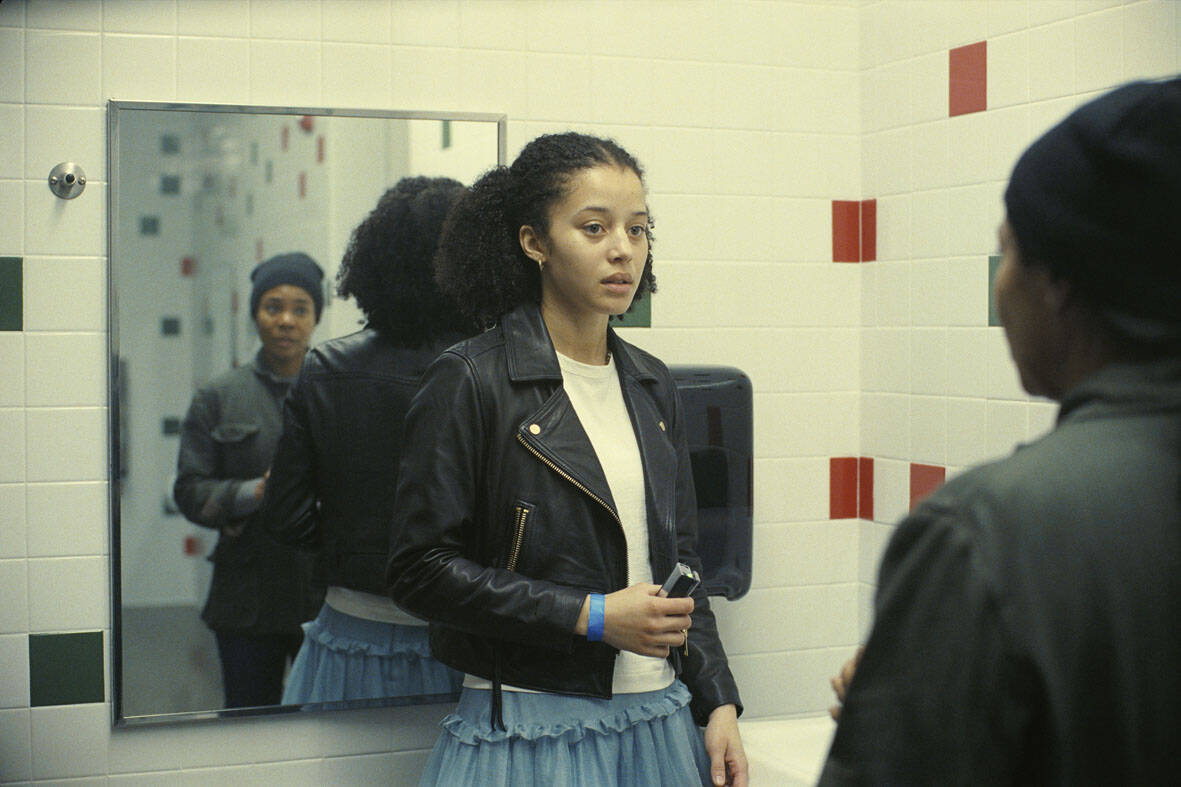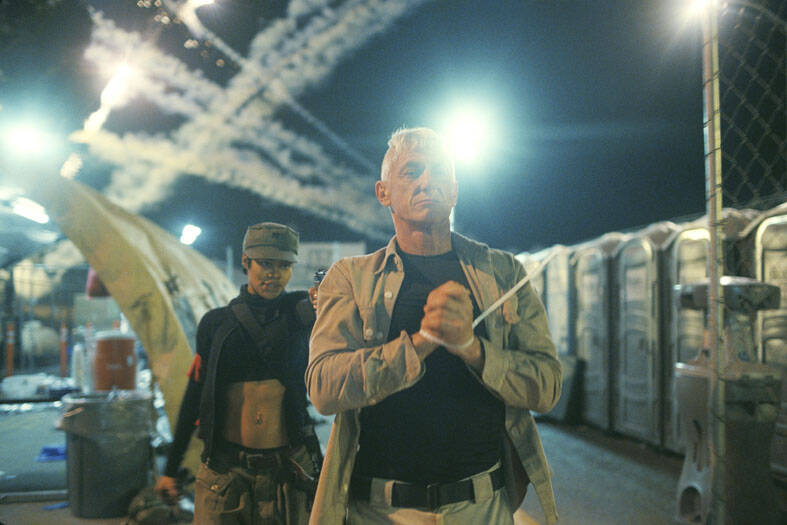In Paul Thomas Anderson ’s gloriously messy, madcap roller coaster ride through modern America, objects in the rear view may go out of sight, but they don’t disappear.
Political struggles never die in One Battle After Another, they just repeat. Or maybe they grow older and become paranoid, pot-smoking, pajama-wearers like Bob Ferguson ( Leonardo DiCaprio ), a washed-up revolutionary living off the grid with his daughter, Willa (Chase Infiniti). The cycles of oppression and resistance are palpably felt in Anderson’s film, a decades-spanning odyssey where gun violence, white power and immigrant deportations recur in an ongoing dance, both farcical and tragic.
But One Battle After Another could also be fairly described as a sweet movie about a father coming to terms with his teenage daughter having a phone — which is one example of how Anderson’s destabilizing approach to big themes can turn poignant and revelatory. “Sweeping” would normally be a way to characterize a nearly three-hour-long, multigeneration saga like this, but Anderson works in a more rough-hewn, compassionate register that burrows strangely but acutely into the American psyche.

Photo: AP
One Battle After Another is arriving after months of speculation and some skepticism because it’s easily Anderson’s biggest budgeted, largest scaled film yet. But scale is an interesting thing when it comes to Anderson’s movies. Magnolia is modest by most metrics, but you’d be hard pressed to find a more ambitious movie. There Will Be Blood didn’t feature much spectacle beyond some rickety wooden oil rigs, but it feels about as large as the frame of Daniel Day-Lewis’ Daniel Plainview, which is to say terrifyingly enormous.
Likewise, One Battle After Another, shot on VistaVision, is big and long but feels intimate and fast. That’s partly due to the propulsion of its opening prologue and the absurd knockout vigor of Teyana Taylor as a scorching, potent screen presence. Her Perfidia Beverly Hills is at the center of the movie’s beginning. And she makes such a powerful mark that it takes half an hour for One Battle After Another to pick up the pieces after it moves on. (My personal recovery time is ongoing.)
We first see Perfidia, dressed in all black, striding across an overpass. Below is an immigration detention center. The atmosphere is tumultuous. Bob is there, ready to set off fireworks or bombs, but has little clue of the plan. She assures him: “Make it big, make it bright. Inspire me.”

Photo: AP
They and their co-conspirators soon announce their intentions, freeing the immigrants, tying up the military guards and declaring that they’re the radical group the French 75. This is the start, Perfidia says, of a revolution. Their cause is righteous but their drive is visceral and sexual. Bomb-making and sex go hand in hand. Bob trails after Perfidia, in love with her but also in awe. Perfidia’s mother doesn’t give them much of a chance as a couple. “She’s a runner and you’re a stone,” she tells him.
At the same time, Perfidia comes in contact with Colonel Lockjaw (Sean Penn), a rock-jawed military man who, too, swoons for Perfidia. When they first meet, she holds him at gunpoint and tells him to “Get it up,” and she doesn’t mean his hands. These charged scenes, followed by Perfidia’s pregnancy and new police trouble for the French 75, set the table for the drama to come, set 16 years after this opening salvo, a frenetic eruption of Black and female power.
By then, the forces fought by the radicals have clawed back their advantage. Lockjaw (this is a taut, drained, maniacal Penn) now moves with impunity, directing troops on illegal raids where he chooses. Some of those in power like what he’s doing. A secret white supremacist group called the Christmas Adventurers (they speak of cleansing the Earth and greet each other with “merry Christmas”) offers him a membership.

Photo: AP
The French 75 are essentially no more. Bob is now alone with their 16-year-old daughter. He’s grown less connected with the world. He calls his daughter’s friend “Homie,” has trouble with pronouns and usually has a roach going. It’s the most Lebowski-esque performance by DiCaprio, whose recent gravity toward less polished, error-prone characters (Killers of the Flower Moon, Once Upon a Time in Hollywood) has made for some of his most interesting movies.
Willa, though, is said to have her mother’s courage. (Infiniti, a newcomer, has an inner strength that comes across clear as day.) When Lockjaw comes looking for Willa, a new cycle of state-sponsored violence is set off. That brings in a delightful Benicio Del Toro as a combination sensei and Harriet Tubman-like figure to immigrants who shepherds Bob when the authorities are closing in. This is probably the most shambolic section of the movie, but Del Toro’s Sergio St. Carlos is also the film’s most resonate encapsulation of freedom. He’s free because his purpose is clear and principled.
This is a movie filled with police convoys across the land and military tactics that effectively turn modern-day America into a battlefield. The film, inspired by Thomas Pynchon’s Vineland, shares some of the culture clash of Anderson’s earlier Pynchon adaptation, Inherent Vice. But One Battle After Another, graced with a swelling score by Johnny Greenwood that gives the movie a hint of epic, feels more urgently contemporary and more morally motivated.
That makes One Battle After Another, as a major studio release clattering with straightforward representations of racism, xenophobia and vigilantism, an exception in almost every way to modern-day Hollywood. I’m sure that will bring debate, just as any good movie does. And I’m sure some will find its American portrait muddled and chaotic. But those aspects feel true, too, just as does the movie’s abiding fighting spirit.

Towering high above Taiwan’s capital city at 508 meters, Taipei 101 dominates the skyline. The earthquake-proof skyscraper of steel and glass has captured the imagination of professional rock climber Alex Honnold for more than a decade. Tomorrow morning, he will climb it in his signature free solo style — without ropes or protective equipment. And Netflix will broadcast it — live. The event’s announcement has drawn both excitement and trepidation, as well as some concerns over the ethical implications of attempting such a high-risk endeavor on live broadcast. Many have questioned Honnold’s desire to continues his free-solo climbs now that he’s a

As Taiwan’s second most populous city, Taichung looms large in the electoral map. Taiwanese political commentators describe it — along with neighboring Changhua County — as Taiwan’s “swing states” (搖擺州), which is a curious direct borrowing from American election terminology. In the early post-Martial Law era, Taichung was referred to as a “desert of democracy” because while the Democratic Progressive Party (DPP) was winning elections in the north and south, Taichung remained staunchly loyal to the Chinese Nationalist Party (KMT). That changed over time, but in both Changhua and Taichung, the DPP still suffers from a “one-term curse,” with the

Lines between cop and criminal get murky in Joe Carnahan’s The Rip, a crime thriller set across one foggy Miami night, starring Matt Damon and Ben Affleck. Damon and Affleck, of course, are so closely associated with Boston — most recently they produced the 2024 heist movie The Instigators there — that a detour to South Florida puts them, a little awkwardly, in an entirely different movie landscape. This is Miami Vice territory or Elmore Leonard Land, not Southie or The Town. In The Rip, they play Miami narcotics officers who come upon a cartel stash house that Lt. Dane Dumars (Damon)

Today Taiwanese accept as legitimate government control of many aspects of land use. That legitimacy hides in plain sight the way the system of authoritarian land grabs that favored big firms in the developmentalist era has given way to a government land grab system that favors big developers in the modern democratic era. Articles 142 and 143 of the Republic of China (ROC) Constitution form the basis of that control. They incorporate the thinking of Sun Yat-sen (孫逸仙) in considering the problems of land in China. Article 143 states: “All land within the territory of the Republic of China shall